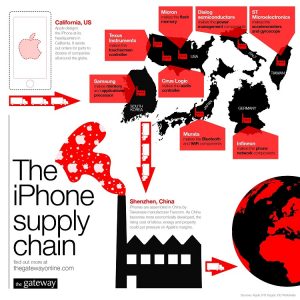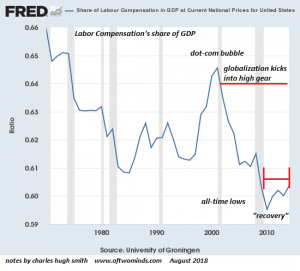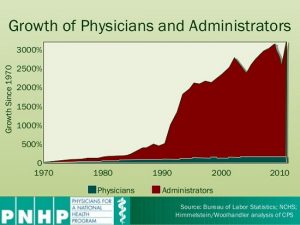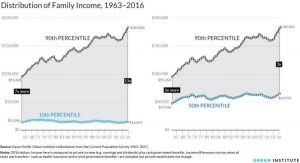
Transcript: Yra Harris & Peter Boockvar On The Beginning of Central Bank Capitulation
FRA: Hi, welcome to FRA’s Roundtable Insight .. Today we have Yra Harris and Peter Boockvar. Yra’s a hedge fund manager, global trader in foreign currencies, bonds, commodities and equities for over 40 year. He was also a CME director from 1997 to 2003. And Peter is Chief Investment Officer for the Bleakley Financial Group. He has a newsletter product called boockreport.com, which has great macroeconomic insight and perspective with lots of updates on economic indicators. Welcome gentlemen!
Peter: Thanks Richard!
Yra: Thanks Richard!
FRA: Great! I thought today we’d begin with a discussion on what’s happening in the markets, and it’s the 7th of March, we just had some news from Europe on the ECB, what are your thoughts on the announcements and ECB policy in general? We can start with Peter!
Peter: So, the ECB is basically turning into, and we saw it officially today into the Bank of Japan, and that their obsession with generation higher inflation caused them to go to all extremes of the earth to QE and have negative interest rates to try to generate that inflation, not foreseeing that what do they do if they go into an economic slowdown. Well now they’re in an economic slowdown to the point where they’ve cut their GDP estimates from 2019 to about 1 percent and they still have negative interest rates, they still have a balance sheet that’s 40 percent of the European region economy. So unfortunately, because they actually believe in the ethicacy of negative interest rates, they said they’re going to continue with negative interest rates for longer than what they said beforehand whereas before they said it ended sometime this summer. This would continue through the end of the year. Unfortunately, the European banking system is suffocating from negative interest rates and basically no yield curve and they’re basically bleeding from that and instead of giving them some sort of relief, Draghi stuck them with more blood and that’s why the European Bank stock index fell more than 3 percent today. So we’ve reached a point, today can actually be a very important inflection, where the market is not rallying on further central bank easing. It’s actually now scared of further central bank easing and if that is the case we’re in the new investing world.
FRA: Your thoughts Yra?
Yra: I can’t agree more with what Peter said and not only did the equities not rally today, gold really struggled because the dollar, as we’re talking before and I think Peter (inaudible 3:49 – 3:51) is that the strength of the dollar today kept the gold bulls in check but really what Peter talks about and what we did see is this the beginning of the capitulation of central banks to finally admitting that they really don’t know what’s going on and they’ve made such massive bets about it, and as Peter says, we’re all basically, especially the ECB, is now mimicking the Bank of Japan because it doesn’t know its way out of here. It has no concept of how it gets out of here.
What was interesting today, and I’m planning on blogging about it tonight, is that Draghi, who wasted everybody’s time for 45 minutes because you really had nothing to say and people who were surprise by what was said about the TLTRO and they haven’t been paying attention because I think this was very well telegraphed. There’s no way that they were going to be raising rates and they’re really trapped here and again they play with the numbers because now you know they’ve lowered the GDP forecast down from 1.7% to 1.1% for the Europeans Eurozone and that gives the ECB cover for what’s taking place. What Draghi did, there was a question about the euro bond and we’ve talked about this I know Peter and I’ve talked about this and with you Richard many times over the last four years, you know the euro bond and was that going to come to fruition and Draghi actually handled it by saying look it you know make me he’d love to see it but he admitted it’s a political decision. But I think that’s nonsense because it’s not a political decision; when Mario Draghi himself in July of 2012 said ‘oh we will do whatever it will take’ therefore it can’t be a political decision and the ECB sitting on this massive balance sheet, which is built on the capital key based on the GDP ratios of everybody within the Eurozone. I’m willing to wager that I don’t know when it’s going to be, it won’t be when Mario Draghi’s there, but the wish of George Soros and others is to create a euro bond and they’re going to do it synthetically by just folding the entire ECB balance sheet into a euro bond. It’s almost going to be like what Alexander Hamilton did in 1790 when he took on the debt of all the individual states but it will be interesting because it will have to take a major capitulation by the Germans. If the Germans don’t go along with it it’ll never happen and that’s what Draghi alludes to by saying it’s a political decision. If they get the Germans to do it but if the Germans go kicking and screaming the turmoil that you will see in the global financial markets will be unbelievable but this is the path we’re on but more important I think Peters point about the especially the U.S. stock market and European stock markets not being able to rally today is a sign that the market is starting to get tired of this (inaudible 7:26– 7:30). I said to Peter is Elmer Gantry and it is Elmer Gantry Mario Draghi is when they make the movie of this (inaudible 7:39 – 7:41) so that the role is really reprised to function effectively but I agree with everything that Peter had to say.
FRA: And Peter, what are the implications of this beginning of central bank capitulation? Do you see a new investment environment, as you mentioned, and what does that mean?
Peter: Well, if you believe that the valuations of assets were inflated by what they’ve done well then you should be worried. Now granted this is right now just on the equity side because fixed income is certainly rallying on what Draghi announced, particularly the European bond market where the German 10-year yield ended the day at just under 7 basis points in the 10-year yield and the U.S. is down to 2.64 so bonds are certainly a beneficiary of this, at least for now, but (inaudible 8:37) the stock market that has had a nice rally this year on the Fed backing off and hopes for a China trade deal. Well, if you take away that so-called central bank put and when I say take it away the put is still there but it may not pay out. In other words, if the markets change their viewpoint of the effectiveness of central banks to save the day then that put as I said is not going to pay out and you’ll go right through the strike price. So, I think that’s what people should understand you know there’s ten years of this, everyone’s trained to bond the dips and everything’s going to work out and all we need is a dovish comment and everything’s going to be fine and I want to make a point that this is no longer accommodation, at least in Europe, and Draghi talked about that day. This is, what they announced today, is furthering the accommodation not just keeping things steady-state and I argue that if you are going to damage the profitability of your baking sector, which is the transmission mechanism monetary policy, well then that’s not accommodative having negative interest rates for longer. It’s actually contractionary because the banks are the lifeblood in an economy and if you damage their profitability you’re going to slow growth. So again, monetary policy is not accommodative anymore it’s constructive and unfortunately they don’t yet see that in fact Draghi specifically was talking about the impact of the banks and he still was confident that negative interest rates, which I believe is I’ve said this before the dumbest idea in the history of economics, he thinks that it was an effective tool and remains so.
FRA: And, Yra your thoughts on changing investment environment? How will this affect the steepener type trades that you have been mentioning on U.S. yield curve?
Yra: Thank you Richard for bringing that up. The 530 has made a multi-year high, believe it or not, it got up to about 59.2 I think on the 530. It’s interesting that the 210 sits in here though but I think some of the bid, not some but a lot of the bid on the U.S. long end came because of this, Peter rightly points out, there was a massive rally in the European bond markets today because you know TLTRO does alleviate some of the pressure and especially with banks in Europe who are laden with their sovereign debt. Look at Italy, Italy had a massive rally, usually Peter brings this up so I’ll fill it in for him that the Italian 10-year today is actually 2.46, which is 17 basis points lower than the U.S. 10-year so we’ve had a massive rally. Well, the Italian 10-year yields actually dropped 13 basis points today off of this; it’s an amazing move.
So, we’re starting to see this play out and it is so interesting and I know we’ll get into it more because this is already one of the themes of your work Richard, is that this is all taking place while there’s a huge discussion of course on Modern Monetary Theory, which I know we’ll get to in a little bit, and the fact that these curves can’t steepen (inaudible 12:26) is just mind-boggling. But it is because the central banks are so unified I mean if you listen to Draghi’s words today and you close your eyes you would think you were listening to Jerome Powell because we’re data dependent, data dependent, we’re data dependent! So meanwhile they’re building to manipulate the data to fit whatever the policy that they really want to craft is the key to it and it will take a while. I still say that these curves are going to steepen, we saw a little inversion on the shorter end of it but I think that is really one of the elements that is frightening the Fed here and now they’re all getting in line because as much as what Draghi did today in Europe, to me he absolutely trapped the Fed here because with the Europeans now pivoting back towards not tightening, the Fed cannot possibly tighten and we’ll certainly hear. I’m waiting, while we’re probably recording this, it wouldn’t surprise me to see Donald Trump come out and say you know we’ll wait for (inaudible 13:39 – 13:40) and it’ll be complaining if the dollar is too strong the Fed is too tight yada yada yada and but Draghi has trapped out. The Fed can’t move and of course we had Lael Brainard whose as political as Trump is as far as I’m concerned directly monetary policy talk about that the slowing global growth is a reason for the Fed to hold its fire. So, we have a lot of things in play here but we should certainly hear from the president maybe we’ll wait until after tomorrow’s unemployment number but it is very interesting.
FRA: And if we look at what’s happening in China with a slowdown there and a massive debt problem, could there be a Chinese currency yuan devaluation to address those challenges and what would be the effect on Europe? Could that exacerbate the situation in Europe? Peter?
Peter: I actually I don’t think that the Chinese want to do that. I think well first of all the pressure from the U.S. would be extraordinary and I don’t think they want to invite that and I think number two well maybe a weaker currency is inevitable in China with all their imbalances on the trade side, the current account is going negative, the amount of debt that they have, balanced payments shifting so the weaker yuan may happen anyway but I don’t think there’s going to be an intentional devaluation. It would be more market driven because I think the Chinese know over time they’re going to be shifting their economy away from fixed asset investment as a main driver and more to the services side and consumer spending. Well, they need a stronger currency for that or least a stable one. So that’s how I would put it.
FRA: And Yra, your thoughts?
Yra: I think Peter is absolutely right. If it happens it’ll be because of things around it because I don’t think the Chinese really they don’t want to run a follow of I’m not going to say Trump but Lighthizer and Lighthizer’s one of his favorite tools is currency valuations and I think the Chinese understand that they’re not looking to tangle with Robert Lighthizer and I don’t think it’s in their interests. You know if you’re trying to pivot your own economy into more domestic consumption you don’t want a weaker currency. A weaker currency is not going to (inaudible 16:16 – 16:17) so I agree with Peter. I think that’s not what’s going to be a catalyst and Europe has just enormous problems, political and economical. Well the political I think is really is affecting the economic and they don’t have an answer to it and again going back to the Draghi press conference today, he talked about you know the necessity of a banking union in the capital markets union, which of course is the creation of a euro bond. They did this all backwards and you’re paying a price for (inaudible 16:51 – 16:53) and it will be interesting the way this plays out. But their situation with China is of course you know also spills out from Germany because the Germans are major trade partner with China they do huge business there, there’s the high-end engineer products that Germany does produce especially when it comes to machine tools and automobiles and always have done very well so there’s so much (inaudible 17:30) but I don’t think that the Chinese are looking to depreciate the currency. They don’t want to wrath of the world right now. In fact if anything they’ll avoid it because they’d rather divide and conquer the U.S. and today was interesting because of course we had the Italians come up, which the Italians are interesting to watch now because they came out in support of the Belt and Road Initiative, which angered everybody in Brussels and Washington and other places and it’s interesting to see how the Italians are so in depth now and sticking their fingers in everybody’s eyes in order just to raise the heat on a lot of different issues but I don’t think there’s any need for the Chinese to play with their currency at all.
FRA: Okay, let’s move on to a discussion of Modern Monetary Theory MMT. What is it and could it be applied to infrastructure of spending? Does it make sense to do that, what are the issues and concerns around MMT does it make any sense? Peter?
Peter: It’s more crackpot economics in Keynesian economics to the extreme that money grows on trees and we can use that money that grows on trees and spend it any which way. The problem is it assumed that we have like a closed economy and that foreigners who hold a lot of dollars they’re not going to be bothered by all the money printing. It assumes that we have all these excess resources that can easily be utilized to carry out whatever spending initiatives we have. So yeah let’s print money and go fix roads and bridges well where are the workers for that? Well they’ll have to come off the lots of housing construction. Well then whose going to build the houses? I think and also its potentially hugely inflationary and that you know there’s a fixed level of supply for things and you just spend money that falls from the sky well then that demand will overwhelm supply and you’re going to get much higher inflation. So it’s economic nonsense but you know we live in a world with a lot of economic nonsense.
FRA: And Yra, your thoughts?
Yra: Well I mean there’s so many ways to go at this. Peter you know who was after that way and I agree with that and yet you know I’ve spent a lot of hours trying to look at this and trying to understand this because what am I missing here because I said well it’s getting so much play and actually the proponents of it have gotten exactly what they want because the fact that we’re sitting here discussing it which pales to the fact that Krugman and Rogoff and Summers and now they’re thinking of that there is some giants who are having who are being forced to respond to it so they’re getting a lot of play which is what you know probably part of their issue was. It was interesting today too and this didn’t surprise me to see Paul McCulley who a PIMCO Fame, in fact I’d argue was really the great brains behind PIMCO all those years, Bill Gross would probably take umbrage at that, but I had a lot of respect for Paul McCulley but Paul McCulley came on said well you know what don’t just brush this off so rattle it so quickly there may be something here to it which didn’t surprise me because one of McCulley’s (inaudible 21:23 – 21:24) going back a couple decades is the Keynes concept of the paradox of thrift and was one of the big issues from Paul McCulley.
And the MMT discussion actually falls within that paradox of thrift and how to counteract it, which you know Maynard Keynes was very worried about it because when you anticipate that when things have feedback loop that turns recessions into depressions as people start to save more and demand diminishes dramatically that as you save more there’s less investment and there’s less activity in because nobody’s investing because there’s no demand. So, I could see how McCulley would go that way I just cannot wrap my head. The more I think about it the more ridiculous it becomes and as Peter rightly said the biggest flaw in it is that it depends upon its models built on a closed economy. Well, the United States the dollar is the world’s reserve currency. With that it comes with a fiduciary responsibility and the MMT argument is the most irresponsible form of economic action that I can imagine and it’s you know what but it doesn’t surprise me because it mimics what the Swiss National Bank has done. You know that was going to be the problem is that you cannot create a perpetual money machine. If that’s the case then you know what I may as well quit working, take on as much debt as I can and then wait for them to print money because what’s the difference? So you’re basically telling me that wealth can be created merely in a printing press. Well, if the wealth can be created as a printing press then what are we all working so hard for? And you know what, nothing then matters so I just I can’t get there and I keep trying to struggle as to where these people come from and I know that as Eric Peters pointed out in Ben Hunt that one of the major flaws in this says that it depends upon a engaged and enlightened electorate. I mean that’s what Warren (inaudible 23:54-23:55) talked about and if you think that’s what we have well we’re really in trouble. So I am really I’m nervous about it because the biggest flaw to me of course is that it breaks down the firewall between monetary and fiscal policy and puts it in the hands of one political entity and that should make all of us nervous so I am not a proponent.
FRA: And along with this discussion is usually mention of debt and deficits. Do they matter or should we overlook it or downplay it? When will this become apparent in interest rates in a bigger more apparent way an accelerated way in terms of rising interest rates and U.S. dollar weakening? Peter?
Peter: I mean we’ve been trying to figure that out for 30 years and it was the 1980s when people we’re talking about the exploding budget deficit and rising debts, so it’ll matter when it does and it doesn’t matter until it does and trying to figure out when it does is is really difficult. I mean it mattered in Europe in 2011, 2012 and we saw a spike in yields, an increase in the periphery. It certainly mattered last year when Italy when you saw basically a crash in the Italian bond market. When it’s going to matter for the U.S.? I think it begins to matter not necessarily initially from a market perspective but when interest expense starts to take up a greater portion of the budget and starts to crowd out other things. I think that’s when it will get a lot of attention but until then I’m not really that sure I mean I do have to say well you know Treasuries are rallying today for example in the ten year is down to the 2.64. The 10-year yield is 2.40 at the end of 2017. So here we have a global economy that’s clearly slowing. We have a stock market that hasn’t done anything in basically a year and yields are actually still higher and you know and then that’s with German yields back down again, that’s where the Japanese ten-year below zero again and U.S. yields are still higher so I’m not sure yet what that means I don’t know if that means that people are beginning to care and that the Fed is no longer buying and foreigners have dramatically reduced their purchases of U.S. Treasuries and the Chinese and the Japanese aren’t buying any and we’re beginning to push back against these rising debts and deficits that remains to be seen. But it is something that we should pay attention to because you know nothing matters nothing negative matters when you’re in a 35-year bull market which is what we had in bonds but maybe if things have shifted and it’s no longer a bull market maybe things like debts and deficits actually do matter but timing wise that’s really difficult.
FRA: And Yra, your thoughts?
Yra: I agree with Peter it’s well said and I just look around the world and yes I know people are chasing yields and I shouldn’t I talk to people and I go why would you buy a 10-year note? I said why would you have somebody buy a 10-year note? If I’m wrong and I’ll speak for Peter if he’s wrong about what is going to take place here, what is it going to cost you if I moved everything into a 2-year Treasury from the long end which actually Rogoff talks about to, what’s it costing me? 15, 16, 17 basis points to take on that shorter duration with all the uncertainty and with the growing debt levels? MMT’s music to Donald Trump’s ears because if none of this matters well spend freely and again you know I’m always bothered by the fact that we’re running a trillion dollar deficit in a time you know as the White House would say a booming healthy economy. But there’s something majorly wrong here and then as I maintain the MMT crowd, whose an anti-trump crowd, is actually forming the runway for him to do whatever he wants so I don’t even understand the politics of it and I don’t think they do either, they haven’t thought it through. So there’s so many things afoot here but if I was a foreigner sitting out there and I’m sitting on lots of dollar assets, I would be moving the short end as I could be if not moving totally out of dollars because this discussion the fact that this discussion has reached the level that it has, when I say level I’m talking about the fact that you have some of the top economists the giant’s in the Neo-Keynesian role of economics, people who have won Nobel prizes entertaining the discussion I would be starting to move out of dollar assets just as a safety mechanism. They sit here and I’m not sure whether it’s just the algorithm. I’m not sure what this is but for doing this for as long as I have I scratch my head and I go people are acting very very irresponsibly by not moving and getting ahead of this and waiting for the events to unfold and then it’s going to be a sorry world.
FRA: Fully agree. Recently an Australian economist Satyajit Das wrote about the risk of collateralized loan obligations. These are securities consisting of a pool of loans organized by maturity and risk typically. These CLO’s a lot of them have been purchased by Japanese banks. Do you see this as a risk to the financial markets and the Japanese financial system? Peter?
Peter: I don’t see it as a risk to the system. I see it as an area where there’s been access and in response to lower interest rates and the leveraged loan market is now bigger than the high-yield market and when you have a search for yield you have investors that don’t make the best decision and if this financing spigot gets turned off, because the cycle turns and companies with too much debt and not enough cash flow get hurt, well then there’s going to be a credit crunch and there’s going to be a credit crunch across the spectrum. So that’s the risk and a lot of the credit quality is weak, the covenants are non-existent and this is an important area to focus on and like I said this was an area of access this time around. So you have total business debt, whether its corporate or partnership or private or whatever, as a percentage GDP is the highest on record not including the recession in Q1 of ‘09 and yeah that’s going to matter at some point and you know as he (inaudible 31:28) pointed out, households balance sheets have improved in the cycle that’s where the access was though last time and the excess outside of sovereign balance sheet is certainly in the corporate balance sheet. And that’s why I’m expecting a focus this year on deleveraging and that companies are going to be focused on improving balance sheets and that every conference call you will be hearing the CEOs being asked ‘what are you doing to improve the balance sheet’ so you’re going to hear a lot more about that. Now some companies will be able to get away with that and they’ll be able to cash flow their way to a safer spot but there are going to be plenty of businesses if the slowdown continues that are just going to choke on too much debt.
FRA: And your thoughts Yra?
Yra: Exactly where the world sits right now and I find it more troubling that here in the U.S. rather than building up those counter cyclical buffers that even the Fed voted you know to provide some relief with. I just don’t understand it because you have government quarrels in his role as chair of the Financial Stability Board or actually I don’t know if he’s the chair but he has certainly an important position there they’re talking about this and yet they’re rolling back, their lightening up on some of those rags and that’s the wrong ones. The banks should be building these counter cyclical especially now that your profits are up even though of course some of these policies are so stupid from a central bank perspective (inaudible 33:14-33:16) domestic bank earnings but I would not be rolling back these counter cyclical bluffers I’d actually be mandating that the banks actually roll up their capital base as long as they’re going to be walking down this road. I think it’s not a healthy sign and you know it’s not like the banks are in such great shape. I was showing some people I said you know if we went back 12 years (inaudible 33:39-33:42) is 10 percent the value that it was 12 years ago because they did the reverse split of one to ten. So, the stock trades is sixty-two dollars well on a split adjusted basis it was six hundred and twenty dollars so the banks have really not you know some of course you know that’s a broad brush but a lot of the financial institutions they’d never regained the stress that they saw prior to the onset of the financial crisis. So and these outstanding loans as people are chasing yields and leveraging themselves up in order to find greater returns are very problematic especially with the global economy slowing.
FRA: And finally, what are your thoughts in terms of the other risks to the financial markets and the economy do you see that we haven’t covered as yet? Peter?
Peter: I think one of them is maybe there is a day when the ECB, because it won’t be Draghi because he’s gone in 6 months, that the central bankers wake up and say you know what negative interest rates was a really bad idea, we’re killing our banking system and we need to get out of it. You know problem is that that would tank and pop the balloon of the biggest bubble in the history of the world, that being sovereign bonds and negative yielding securities, which total depending on who you look at eight to eleven trillion dollars and a lot of these banks in Europe hold a lot of these bonds. So, from a systemic and earthquake-type risk it’s that in my opinion.
FRA: And finally Yra your thoughts on that? Other risks that you see?
Yra: Well you know it comes back to the banks and it’s interesting that now the BIS is starting to relook at it again and the fact that these European banks, the domestic banks, are stuck to the (inaudible 35:57) with their own sovereign debt because they carry the zero risk waiting. Are you going to tell me that (inaudible 36:05) 10-year are zero risk weighted? I mean, in what world could that possibly be accepted in the world of the Jabberwocky of Draghi going down the rabbit hole with all the other central bankers. It’s insanity and that’s a serious issue because if you were to change that, which it needs to be changed, the hit to the bank capital would be dramatic but this needs to be dealt with because there is no way in this world that all sovereign debt should be zero risk weighted as an asset just no way and especially with this conversation of MMP. That is ridiculous because you are now telling me that you and if the conversation continues to grow the impact is just going to be phenomenal and you have to deal with this now so I’m right in line following Peter and this zero risk waiting is a very very very dangerous systemic risk and it has to be dealt with by the regulators. Unfortunately the regulator’s are the same one who are benefiting from the fact that you know sovereign bonds are zero risk weighted because it makes them a desirable asset from a lot of different participants. So, there is a very ugly relationship that goes on there and it is systemically very destabilizing.
FRA: Wow great insight gentlemen! How can our listeners learn more about your work? Peter?
Peter: They can go to bleakley.com and reach out to me if they need any help with wealth management and managing money where they can read my daily work at boockreport.com.
FRA: And Yra?
Yra: Just notesfromunderground or yraharris.com and of course these podcasts which I think you know provide a lot of good inside and that’s the feedback I get from people around the world, how much they enjoy them because it brings a level of discussion that needs to be had out there and that people need to understand and get a handle on. So, the markets show great complacency and I think Peter and I would absolutely find camaraderie in the great complacency in the world and yet there are so many things in the boil that right now I’m very nervous and I think todays stock market action should send off some concerns of that but again notesfromunderground and keep reading Peter’s stuff because he’s on top of this stuff as well as anybody else’s.
FRA: Great! Thank you very much gentlemen! Thank you!




 03/07/2019 - The Roundtable Insight: Yra Harris & Peter Boockvar On The Beginning of Central Bank Capitulation
03/07/2019 - The Roundtable Insight: Yra Harris & Peter Boockvar On The Beginning of Central Bank Capitulation









